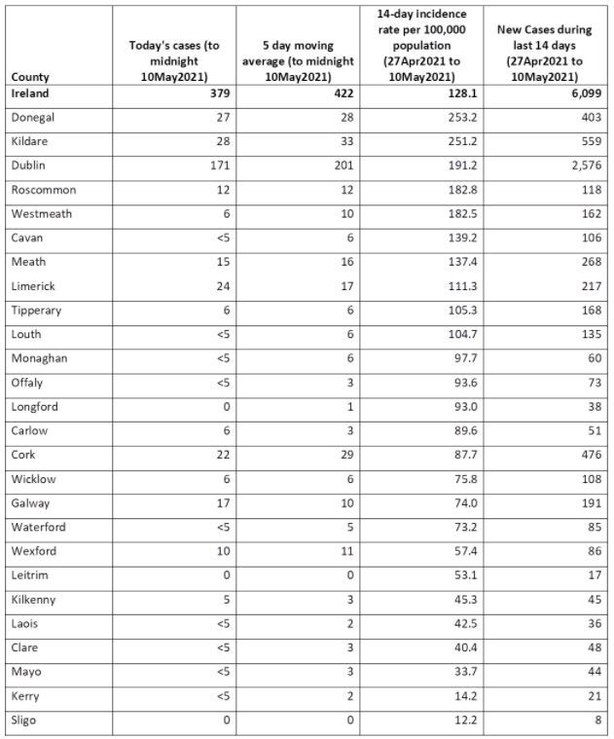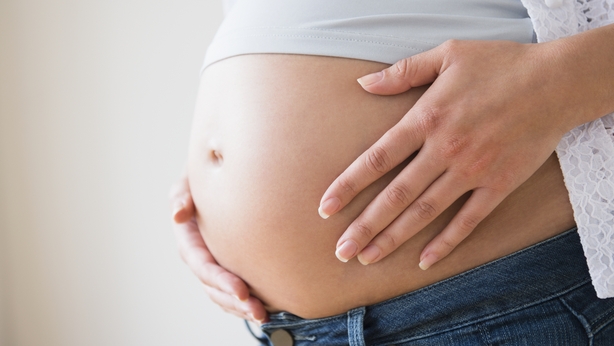There have been nine Covid-related deaths and 379 new cases of the disease notified to the Department of Health.
A total of 4,929 people have died with coronavirus here while the cumulative number of confirmed cases since the pandemic began is 253,567.
The number of patients with the virus in ICU is 34, a rise of three since yesterday. There are 117 people with Covid in hospitals, including 20 additional hospitalisations in the past 24 hours.
Chief Medical Officer, Dr Tony Holohan, said: "This week is a hopeful week and one that we have all been looking forward to. We have gotten to this point by working together in following the public health advice and reducing incidence of disease in our communities.
"We need to continue to focus on the measures that we know can protect ourselves and our loved ones from Covid-19.
"We can plan to meet friends and family where it is safe to do so and those who have been vaccinated can have confidence in their vaccine. They are now able to get out and about and enjoy the benefits of the vaccine."
Dr Holohan added: "The two primary targets as we try to exit the pandemic are vaccination and low transmission.
"If we can keep cases low and continue to vaccinate as many people as possible, we will find ourselves in a very different risk environment where we can see further easing of measures.
"Our task now is to keep the disease under control by following the basic measures and taking up our vaccine when it is offered to us."
Of the cases notified today 190 are men, 185 are women and 77% are under 45 years of age. The median age is 29 years old.
There were 171 cases in Dublin, 27 in Donegal, 28 in Kildare, 24 in Limerick, 22 in Cork and the remaining 107 cases were spread across 18 other counties.
The 14-day incidence rate per 100,000 population nationally is 128.1. Counties with the most cases include Donegal (253.2), Kildare (251.2) and Dublin (191.2).
Counties the the least number of infections are Sligo (12.2), Kerry (14.2) and Mayo (33.7).

The five-day moving average of cases is 422.4, while a week ago it was 489.
How many vaccinations have been administered so far?
Latest coronavirus stories
As of last Sunday (9 May) there have been 1,848,747 doses of Covid-19 vaccines administered in Ireland. 1,347,561 people have received their first dose while 501,186 people have had their second dose.
This means over half a million people have now been fully vaccinated.
From today, people aged 52 years can register with the HSE for a Covid-19 vaccination.
People who are older can still register, if they have not done so.
In Northern Ireland, the Department of Health has reported one further coronavirus death during past 24 hours. The official death toll now stands at 2,148.
89 new cases of the disease have also been confirmed.
There are 56 confirmed Covid patients in hospital, with 3 in ICU, all of whom are on ventilators.
A total of 1,485,125 vaccines have been administered to date in Northern Ireland.
On Tuesday, the 500,000 mark for second doses administered was exceeded.
One million first doses of vaccines are also close to being administered, the Department of Health said.
34.5% of adult population have received first vaccine dose
The Minister for Health Stephen Donnelly has said 34.5% of the adult population have received a first dose of a Covid-19 vaccine and 12.8% are fully vaccinated.
The advice from the National Immunisation Advisory Committee (NIAC) on the use of the Johnson & Johnson (Janssen) and AstraZeneca vaccines in people under 50 is expected later this week, Mr Donnelly said.
He also said rapid antigen testing has "an important role to play" in dealing with the spread of Covid-19.
Mr Donnelly said it's "not a silver bullet" but is one of the tools we can use.
He said he is working with Cabinet colleagues to roll out rapid antigen testing in different sectors, including among businesses as well as in colleges and meat-processing plants.
A working group has been set up to support this strategy and testing is being piloted in controlled environments with expert advice, according to the minister.
In relation to recent adverts by supermarkets for the sale of antigen testing kits, Minister Donnelly said he does not believe the adverts are helpful.
He said: "They gave a sense that you could get your rapid test and you could get your barbecue, and you could test yourself.
"I think there would be people who would potentially infer from that, that once you get a negative test that you may not have it, but that's not necessarily the reality at all."
Last weekend NPHET member Professor Philip Nolan commented on a Twitter post from supermarket Lidl, which was advertising the sale of antigen tests together with barbecue items, by saying "can I get some snake oil with that?"
Minister Donnelly said this was "not a helpful" comment from the head of the Irish Epidemiological Modelling Advisory Group".
He added: "I have great respect for Professor Nolan and I have no doubt his concern was about people using them in the wrong way."

Vaccinations for pregnant women can now be booked
Several Irish maternity hospitals are advising pregnant women they can now book a Covid-19 vaccination.
It follows a recommendation from the HSE and the National Immunisation Advisory Committee (NIAC) that expectant mothers should be offered an mRNA coronavirus vaccine between 14 and 36 weeks' gestation following an individual discussion with their obstetric care-giver.
The National Maternity Hospital in Holles St, Dublin said vaccination clinics for its clients are in the process of being established.
In a post on Twitter, it stated: "They will take place in mass vaccination sites; initially in the Aviva Stadium."
If you attend Holles St and are between 30 and 36 weeks' gestation, you can expect to receive a text message in the coming days.
"The text will ask you to register your interest in getting a vaccine. Once you are registered with us, you will then receive a phone call from our team with information about the mRNA vaccine and will have the opportunity to ask any questions you may have," the hospital said.
Women who are less than 30 weeks into your pregnancy are advised to "bear with us and we will be in contact as soon as we can".
The Rotunda in north Dublin also posted on Twitter, stating: "We are beginning to offer Covid vaccinations to pregnant women booked with the Rotunda Hospital who are between 14-36 weeks gestation.
"All our currently pregnant women will receive a text message with information on how to express your interest in receiving a Covid vaccine.
"Those who express interest will be provided with information about the safety and efficacy of the vaccine (Moderna), and will be asked to complete an online form to register.
"We will then contact you by phone to answer any questions you might have." Vaccination for pregnant women booked in the Rotunda will be provided in Connolly Hospital.
The Coombe maternity hospital, also in Dublin, states on its website that the " best way to protect you and your baby from Covid-19 is to get the vaccine".
It says pregnant women who are between 14 and 36 weeks into their pregnancy are to be offered a vaccine but does not give specific details as to where these vaccinations will take place.
Additional reporting Aengus Cox







